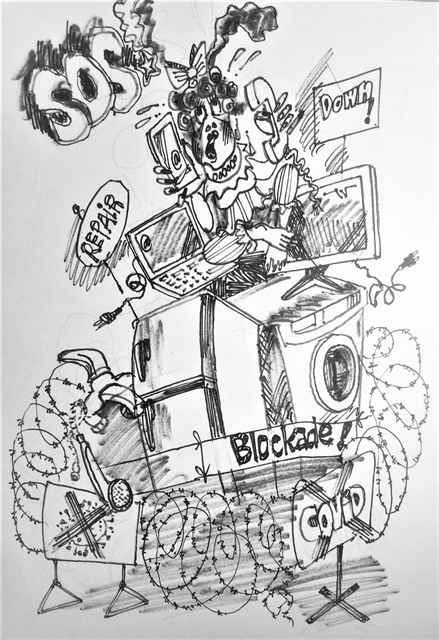 Talk Around Town
Talk Around Town


|
| Illustration by Trịnh Lập |
by Phương Hà
One of the biggest worries while staying at home during social distancing, apart from the deadly virus itself, is having an indispensable household item break down.
Hà Nội has been implementing strict social distancing measures since July 24 to prevent further spread of the pandemic under Directive 16, which requires people to only leave home for emergencies, buying food and medicine, and working in businesses deemed "essential". The city has also imposed fines of VNĐ 1-3 million (US$44-130) on individuals and businesses that violate the directive.
One week after social distancing measures were implemented, Nguyễn Anh Tuấn and his wife in Cầu Giấy District had a row due to a faulty air conditioner.
Tuấn and his wife, both office workers now working from home, saw their air conditioner stop one afternoon after being in constant use serving their family of three.
Tuấn was unable to fix it himself, his two-year-old daughter couldn’t sleep due to the heat, and they had to rely on the use of a couple of fans, which weren’t much used in the stifling 38 degrees Celsius midday heat.
Annoyed by the heat, and sleep deprived by the baby’s crying, his wife gave him the full hairdryer treatment, telling him he should have arranged for a technician earlier.
In desperation, Tuấn tried an air conditioner repairman nearby but they refused to come for fear of being fined under the strict social distancing rules.
He called more electrics stores but they all refused as well, presumably not included in the list of essential goods and services allowed to open during social distancing.
Air conditioners have become an integral part of life, particularly on such hot summer days, and air generated by fans is insufficient. Even at full speed, they cannot wipe away the sweat formed on a baby’s brow.
Tuấn’s wife, worried that her daughter would get sick wanted to send her to stay with family in nearby Ba Vì District on the outskirts of the city. But it was out of question as coaches had stopped running and they would be likely fined at checkpoints if driving by motorbike.
"We will just have to suffer and patiently wait for the day the pandemic is under control,” Tuấn told his, presumably, unamused wife.
Nguyễn Anh Thư, 27, from Hoàng Mai District, has air-conditioning but her laptop has not worked for three days straight. She has tried contacting computer stores but none of them are deemed essential services.
Though her computer is broken, she still has to do her job in customer care. Now she uses her mobile phone to make phone calls to enter customer information. Her greatest fear is that her phone will break down too.
For nearly a week now, Đỗ Hồng Quang, an employee of a refrigeration centre, has received phone calls from customers every day, asking if he can repair their broken air conditioners, fans, or refrigerators.
As more people have been working from home, electricity demand has increased, leading to many household machines breaking down from higher usage.
He constantly replies that he has taken a break from his work and returned home to the suburban district of Phú Xuyên to avoid the pandemic. He tries to put his clients in touch with colleagues to help out but they all refuse due to the distancing rules and fear of contracting the virus.
“I have no other choice but to encourage customers to patiently wait until the pandemic measures are eased,” he says.
At the moment, Tuấn sits at home with a frustrated young child and desperately hopes for a bout of heavy rain to ease the intense heat.
“Like other Hanoians, I strongly support the city’s measures to curb the pandemic but at the same time I hope that the virus gets under control soon so the restrictions will be lifted,” he says.
“We are truly living in difficult days of the war, and the shortage is inevitable. Though comparisons are odious, everyone understands that our daily difficulties are nothing compared to the sacrifices of frontline forces working day and night.
“I believe that we will not have to live in this situation forever. Every little sacrifice now can help the medical teams get us out of these tough times without having to apply stronger measures.” VNS




